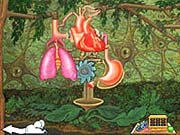 It has been four years since Northern California doctors put Ann Cowan on the kidney transplant waiting list. So far, there have been no matches. It has been four years since Northern California doctors put Ann Cowan on the kidney transplant waiting list. So far, there have been no matches.
But now she's trying a new tactic. In an ad on an Internet bulletin board called craigslist she appeals for a Good Samaritan with O-positive blood. For the 71-year-old psychotherapist, searching for a donor over the Internet is a new experience, and one she acknowledges is fraught with risk. Apparently, some people who've answered her ad are a little more daring. One respondent specifically asks, "What compensation are you willing to offer?" Although federal law prohibits the sale of human organs, there's no record of anyone ever being accused of that crime. But the Internet stirs up fears of a greedy organ underground. Twenty-five years ago, author Robin Cook wrote Coma, a novel about a black-market medical scheme where organs were auctioned to the highest bidder. It was a chilling depiction of one potential side effect of the critical donor shortage. It was only a novel, but it's rooted in some hard facts. Of 80,000 people who wait for organs every year, only 24,000 find donors, according to the California Transplant Donor Network (CTDN), which matches donor organs and recipients. And at least one of every four dies before an organ's found. The organ shortage has fueled the creation of a number of websites and message boards where patients search for donors. Surgical advances allow donors to give kidneys and liver and lung fragments. But hospitals first ask tough questions to make sure no money changes hands. Dr. Robert Osorio, director of transplant services at San Francisco's California Pacific Medical Center, says he worries that corruption might scare away altruism. "If the perception of the public is that this is going on, then I think it will decrease the amount of people out there that are willing to donate," he said. Organ websites reflect a surge in the number of Good Samaritans. Living kidney donors now outnumber donations from the dead, according to data from the Organ Procurement and Transplantation Network (OPTN). Cowan says she hopes one of those donors will answer her Internet ad. Note:
Good Samaritan: someone who gives help to people in trouble or need, without thinking of themselves.
The Samaritans is an organization helping people who are experiencing great suffering of mind and have no one to share their feelings with. (Agencies) | 早在四年前,南加州的醫生就安排安·科文等候進行腎臟移植手術了,然而直到現在她還沒找到相匹配的腎源。 如今她正在嘗試一種新的方式:在craiglist網站公告板上登廣告,用這種方法尋找O+血型的好心人為她捐獻腎臟。 對于這位71歲的心理治療學家來說,借助互聯網尋找捐贈者還是頭一遭,而且她認為這種做法也風險重重。 不過顯然回復她的一些人更加大膽。甚至有一個人專門問道:"你愿意拿什么作為回報呢?" 盡管聯邦法律禁止買賣人體器官,但是目前還沒有人被控此項罪名。然而互聯網的廣泛應用激起了人們對貪婪的網上人體器官秘密交易的強烈恐懼。 二十五年前作家羅賓·庫克 (Robin Cook)寫了一本小說《昏迷》 (Coma),講述了一個黑市醫療陰謀,在這個黑市中人體器官待價而沽,被拍賣給出價最高的人。書中描述的由于捐獻器官緊缺引起的潛在惡果著實讓人不寒而栗。雖然那只是一部小說,但卻有著深刻的現實根源。 根據負責匹配捐獻器官和接受者的加利福尼亞移植捐贈網絡(CTDN)資料,每年有8萬人等待接受器官捐獻,卻只有2.4萬人能夠找到捐獻者。至少四分之一的患者因沒有找到匹配的器官而死亡。 由于器官缺乏,一些為患者尋找捐贈者的網站和留言板應運而生。 外科手術的進步使捐贈者能夠提供腎臟、肝臟以及部分肺片。但是醫院首先要提出一些苛刻的問題以確保過程中間沒有器官轉賣交易。舊金山加利福尼亞太平洋醫療中心的移植服務主任羅伯特·奧索里奧說他擔心腐敗會"嚇跑"那些無私的人。 羅伯特說:"如果公眾認為這種(器官轉賣)現象存在,那么愿意捐獻器官的人就會減少。" 器官網站上涌現出許多樂善好施的人。器官供應移植網絡(OPTN)數據顯示,現在捐獻腎臟的活人比死人數量多。科文希望有捐獻者能夠回復她的網絡廣告。 (中國日報網站譯) |
